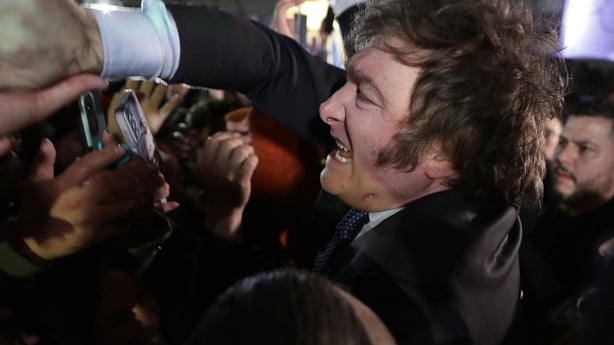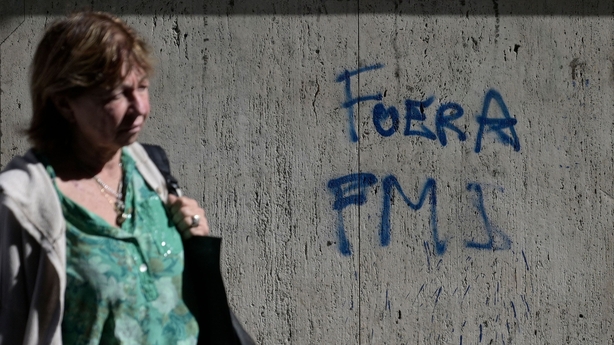Argentina has been left reeling by the surprise surge of political outsider Javier Milei to the front of the race ahead of October's presidential elections, astounding the political establishment which had dismissed the former daytime TV sex coach as a hopeless lightweight.
Here are some key things to know about the self-described "anarcho-capitalist", who was first elected to parliament just two year's ago, and what the rise of this brash 52-year-old Buenos Aires lawmaker could mean for the struggling South American nation.
Unmarried and childless, Javier Milei lives alone with three English mastiff dogs named after liberal economists and who were cloned from his deceased pet, Conan. Mr Milei dedicated his first round win to the canines.
His sister, Karina, is his closest collaborator. Brazil's former strong-man president Jair Bolsonaro is a fan, saying that the two men "have a lot of things in common".
Mr Milei's appearances on daytime TV promoting tantric sex and threesomes, along with controversial economic ideas, first thrust him to national prominence.
He is variously described as being libertarian, far-right, or anti-establishment.

Politically eclectic
"A man with dozens of faces," wrote journalist Juan Gonzalez in the unauthorised biography, "El Loco" ("The Madman").
The term Mr Milei prefers is "anarcho-capitalist", insisting that he is "above all for freedom."
But he has vowed to ban both abortion and sexual education in schools. Describing pupils in the country's free education system as "hostages of a system of state indoctrination", he wants to abolish a slew of ministries including education, health, science, women's rights and gender equality, culture and public works.
Dismissing global warming as "a socialist lie", he has expressed his desire to allow people to sell their organs.
Mr Milei has also proposed "dynamiting the central bank," and replacing the peso with the US dollar.
He is against economic protections including the minimum wage, and wants austerity "harsher than that requested" by the International Monetary Fund (IMF), to whom Argentina now owes $44bn (€40bn).

Blindsided
The presidential elections are still two months away, but an unusual nationwide system of party primaries - which are usually a key indicator of what is to come - saw Mr Milei finish in pole position, having secured 30% of the votes which were cast on Sunday.
His Liberty Advances party shocked pundits and disproved advance polling by pushing the hard-right United for Change candidate Patricia Bullrich - a former security minister - into second place with 28%.
Economy Minister Sergio Massa, from the ruling center-left coalition, came third with 27%.
"No one imagined such an outcome for Milei. He came first in areas where he has no structure or support," said political scientist Juan Negri, of the Torcuato di Tella University.
"An elephant walked past us, and we did not see it," wrote the Clarin daily.
Elected to parliament in 2021, the 52-year-old economist with disheveled hair has grabbed public attention with his radical ideas, regularly appearing on televised panels and with a strong presence on social media.
Political analyst Gabriel Puricelli said that Mr Milei had managed to grab hold of a growing discontent in the country and "build an electorate" out of nothing.
'Nothing to lose'
Asked why they support Mr Milei, his backers, young and old, invariably express the desire for something new in a country dogged by economic malaise.
"Ten years of stagnation and five of high inflation fed into the skepticism of a large part of the population" towards traditional parties, said Puricelli.
Argentina's political scene has for decades been dominated by Peronism, which is heavy on state intervention, subsidies, and welfare programs, with brief periods of governance by the center-right.
The country is facing annual inflation of 115%. Two in five people live in poverty.
The chronic instability of the peso means that many Argentines have to buy dollars on the black market in order to save for the future.
"Our parents, our grandparents, voted for Peronism 20 years ago, 30 years ago, but the country has stayed the same," said 20-year-old student Carolina Carabajal.
There is "nothing to lose, let's try something new because the others have failed", political analyst Carlos Fara said.
Voting takes place on 22 October.

